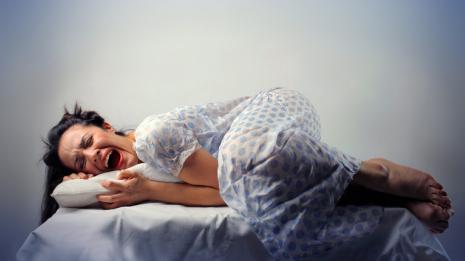Cool New Idea May Help Insomniacs Sleep

Get the world’s most fascinating discoveries delivered straight to your inbox.
You are now subscribed
Your newsletter sign-up was successful
Want to add more newsletters?

Delivered Daily
Daily Newsletter
Sign up for the latest discoveries, groundbreaking research and fascinating breakthroughs that impact you and the wider world direct to your inbox.

Once a week
Life's Little Mysteries
Feed your curiosity with an exclusive mystery every week, solved with science and delivered direct to your inbox before it's seen anywhere else.

Once a week
How It Works
Sign up to our free science & technology newsletter for your weekly fix of fascinating articles, quick quizzes, amazing images, and more

Delivered daily
Space.com Newsletter
Breaking space news, the latest updates on rocket launches, skywatching events and more!

Once a month
Watch This Space
Sign up to our monthly entertainment newsletter to keep up with all our coverage of the latest sci-fi and space movies, tv shows, games and books.

Once a week
Night Sky This Week
Discover this week's must-see night sky events, moon phases, and stunning astrophotos. Sign up for our skywatching newsletter and explore the universe with us!
Join the club
Get full access to premium articles, exclusive features and a growing list of member rewards.
A cap that cools the brain may help people with insomnia sleep at night, a new study suggests.
In the study, insomnia patients who wore the cap slept as well as people with no sleep problems.
The findings may lead to an alternative treatment for the condition, which is usually treated with drugs or psychotherapy.
"The most significant finding from this study is that we can have a beneficial impact on the sleep of insomnia patients via a safe, nonpharmaceutical mechanism that can be made widely available for home use by insomnia sufferers," study researcher Eric Nofzinger, director of the Sleep Neuroimaging Research Program at the University of Pittsburgh School of Medicine, said in a statement.
However, the study was small, and more work is needed to confirm the results. It's unclear whether all patients with insomnia would benefit from the cap in the same way, experts say.
Cooling the brain
Patients with insomnia have difficulty getting to sleep or staying asleep for at least one month, according to the National Institutes of Health (NIH).
Get the world’s most fascinating discoveries delivered straight to your inbox.
Previous research has shown those with insomnia have increased brain activity when they try to fall asleep compared with those without insomnia, and that cooling the brain reduces metabolism activity. This spurred the idea for the cooling cap.
The plastic cap has tubes filled with cool water, which cool the head, putatively lowering the brain's metabolism.
In a 2009 study, Nofzinger and his colleagues showed patients who wore the cap had improvements in their insomnia.
In the new study, the researchers wanted to see whether a higher "dose" of the treatment, that is, colder water, produced a greater effect.
The study involved 12 patients with insomnia and 12 people without insomnia. The patients' average age was 45.
The researchers varied the "dose" the patients received.
Insomnia patients treated with the coldest water took 13 minutes to fall asleep, on average, and stayed asleep 89 percent of the time they were in bed. The people without insomnia took 16 minutes to fall asleep and also slept about 89 percent of the time.
Innovative work
The work is "fascinating" and "extremely innovative," said James Wyatt, director of the Sleep Disorders Service and Research Center at Rush University Medical Center in Chicago, who was not involved in the study. However, there's a long way to go before the research could be applied in a clinical setting, Wyatt said.
There is a need for alternative insomnia treatments, Wyatt said. Only about 25 percent of those who take sleeping pills are satisfied with this treatment, and many worry about side effects or becoming dependent on the pills to sleep, Nofzinger said.
Future research should examine whether the effects of the treatment last beyond the time the patient is using the device, Wyatt said.
The study will be presented today (June 13) at a joint meeting of the American Academy of Sleep Medicine and the Sleep Research Society in Minneapolis.
Pass it on: Cooling the brain may be an alternative treatment for insomnia. This story was provided by MyHealthNewsDaily, sister site to LiveScience.
Follow MyHealthNewsDaily staff writer Rachael Rettner on Twitter @RachaelRettner.

Rachael is a Live Science contributor, and was a former channel editor and senior writer for Live Science between 2010 and 2022. She has a master's degree in journalism from New York University's Science, Health and Environmental Reporting Program. She also holds a B.S. in molecular biology and an M.S. in biology from the University of California, San Diego. Her work has appeared in Scienceline, The Washington Post and Scientific American.
 Live Science Plus
Live Science Plus





